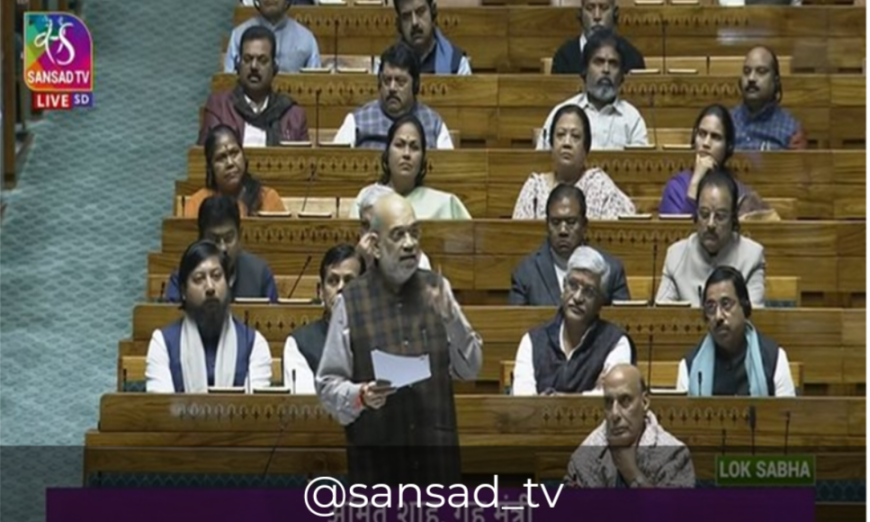Updated, Dec. 20, 2023. 9.09 PM.
Lok Sabha has passed the Bharatiya Nyaya (Second) Sanhita, 2023, the Bharatiya Nagarik Suraksha (Second) Sanhita, 2023 and the Bharatiya Sakshya (Second) Bill, 2023. The Bharatiya Nyaya (Second) Sanhita, 2023 seeks to replace the Indian Penal Code (IPC), 1860, which is the principal law on criminal offence in India. The new bill adds community service as a form of punishment. The Bharatiya Nagarik Suraksha (Second) Sanhita, 2023 seeks to replace the Criminal Procedure Code, 1973 (CrPC). The CrPC provides for the procedure for arrest, prosecution, and bail. The Bharatiya Sakshya (Second) Bill, 2023 (BSB2) replaces the Indian Evidence Act, 1872. The Act governs the admissibility of evidence in Indian Courts. It applies to all civil and criminal proceedings. The provision has been made in these legislations to digitise the entire process from FIR to case diary, case diary to charge sheet and charge sheet to judgment.
Replying to the discussion, Union Home Minister Amit Shah described the three Criminal Bills, that are intended to replace the British era laws as transformative. He said, the new legislation will bring big changes in the existing criminal justice system. Talking about the existing laws, Mr. Shah said, these are 150 years old British era laws and the Prime Minister has decided to end the country from these colonial-era laws. He said, existing laws only have provisions for punitive actions but the new laws have been designed keeping in view the humanitarian approach. He said, that priorities have been given to women and children under the new laws and these laws are in consonance with the spirit of the constitution. He asserted that this is the first time when the terrorism has been clearly defined under new laws. He said, mob lynching is heinous crime and it will attract death penalty under the new laws.
The Home Minister said, under the news Bharatiya Nagarik Suraksha (Second) Sanhita, 2023, there will be 531 sections in CrPC, whereas earlier there were only 484 sections. Mr Shah said, under the new Bill changes have been made in 177 sections and nine new sections have been added, while 14 sections have been repealed.
The Minister said, under the Bharatiya Nyaya (Second) Sanhita, 2023 which replaces the Indian Penal Code (IPC), 1860 will have 358 sections instead of earlier 511 sections. Mr Shah said, 21 new offences have been added and the tenure of punishment has been enhanced in 41 offences.
Home Minister Shah said, under the Bharatiya Sakshya (Second) Bill, 2023 (BSB2), which replaces the Indian Evidence Act, 1872 will have 170 sections instead of earlier 167 sections. He said, changes have been incorporated in 24 sections.
The Home Minister said, in these laws importance has been given to forensic science. Mr Shah said, all the new laws aim at ensuring speedy justice to the victim. Allaying the apprehension of several stakeholders of the society and MPs, he said, wide consultations have taken place over these new Bills. Mr Shah said, these bills have been brought in lines with constitutional spirit to serve the interest of people of the country The provision has been made in these legislations to digitize the entire process from FIR to case diary, case diary to charge sheet and charge sheet to judgement. He said, a new feature of community service has been incorporated as a form of punishment.
Mr Shah said, this is the first government which has fulfilled the promises it has mentioned in its manifesto. He said the government has revoked Article 370 and removed AFSPA from over 70 percent of north-eastern areas. Mr Shah said, Modi government is following the policy of zero tolerance against terrorism. The Minister said, Government repealed triple talaq and gave 33 per cent reservation to women.
Earlier, participating in the discussion, Nishikant Dubey of BJP said, Prime Minister Narendra Modi has taken historic decisions to end the British era 1860 Indian Penal Code, and the Macaulay education system. Asaduddin Owaisi of AIMIM criticized the Bill saying that there are several loopholes which will be detrimental for the people belonging to minority and backward classes. Harsimrat Kaur of Shiromani Akali Dal has said, these Bills have several discrepancies.

